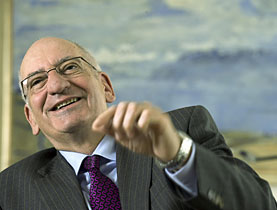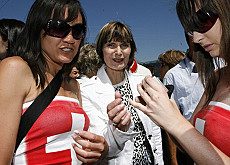Rain, respect and rousing applause

Switzerland's national day may have been dampened by the weather, but it did not stop the country from celebrating its fundamental values.
Politicians were out in force praising – or worrying – about the country’s democracy. But unlike past years there was no disruption to the traditional gathering on the Rütli meadow.
In his address to the nation on August 1, Swiss President Pascal Couchepin called for a Switzerland which renewed itself constantly – in what was considered a veiled attack on the rightwing Swiss People’s Party.
This party, which is no longer represented in the Swiss multiparty government system, has gone into opposition. It styles itself as the defender of Swiss values.
“Respecting tradition does not mean repeating what our predecessors said or did,” said Couchepin, adding that it was all about “giving it life in a new context, change but without losing its memories or roots”.
Systematic opposition, he said, “is not possible, we see it every day”. He added that in Switzerland there was “no alternative but for everyone to participate in public and social life”.
The president said that the concept of solidarity did not limit itself to the Swiss: it had to be extended abroad, especially to the European Union.
Schmid appearance
For their part, People’s Party leader Toni Brunner and its leading light Christoph Blocher pointed to the threats to democracy in their public addresses. Switzerland should fight against any tendencies to curb its freedoms, they said.
Also speaking on August 1 was Samuel Schmid. It was the first public appearance for the embattled defence minister after the resignation of the head of Switzerland’s armed forces, Roland Nef.
Nef tendered his resignation on July 25 following allegations of sexual harassment and questions over his integrity.
Schmid faced considerable pressure to step down after it emerged he did not tell other cabinet ministers of a criminal investigation pending against Nef, who was one of four candidates in the running for the post of army chief last year. Schmid has admitted that it was wrong not to do so.
Details of the allegations against Nef, which included charges of coercion as well as a payment to a former girlfriend as part of an out-of-court settlement, were leaked to the media earlier in July.
Schmid received a warm welcome in Wittenbach near St Gallen. He made no allusion to the Nef affair, instead speaking on his dreams for Swiss society.
No anthem
The celebration at the Rütli meadow, where the foundations of Switzerland were laid, went off this year without disruption.
In 2005 Schmid was booed by a group of rightwing extremists as he gave a speech there. Around 30 extremists were turned away from the meadow this year, said police.
Last year a small explosive device went off at the Rütli. No one was hurt but it did raise questions about security at the event.
Friday’s traditional Rütli celebration did however fall victim to the rain, with a storm causing the festivities to be called off after 40 minutes and even preventing the national anthem from being sung.
Around 500 people had trekked up the meadow, which is near Lake Lucerne. For the first time foreign diplomats were also invited.
Last year the then Swiss president, Micheline Calmy-Rey, attracted 2,000 people when she spoke at the event. This year no ministers were taking part.
Better weather was seen in Berlin, where the southeastern Swiss canton of Graubünden was this year’s “guest canton” at the Swiss embassy. To mark the event, 300 goats and Justice Minister Eveline Widmer-Schlumpf were sent to the German capital.
swissinfo with agencies
Legend says that it was on the Rütli meadow on August 1, 1291, that representatives from three forest cantons around the lake of Lucerne – Uri, Schwyz and Unterwalden – met amid continuing Habsburg repression to sign a pact of eternal mutual defence.
This is said to have laid the foundation of the Switzerland of today.
1291 is taken as the birth date of the country, and August 1 is the official Swiss national holiday.
On July 25, 1940, under threat of a Nazi invasion, Switzerland’s commander-in-chief, General Henri Guisan, held a ceremony at the Rütli in which the entire Swiss officer corps reaffirmed their allegiance to the confederation and to Swiss neutrality.

In compliance with the JTI standards
More: SWI swissinfo.ch certified by the Journalism Trust Initiative


You can find an overview of ongoing debates with our journalists here . Please join us!
If you want to start a conversation about a topic raised in this article or want to report factual errors, email us at english@swissinfo.ch.